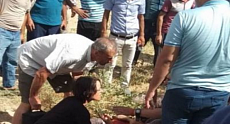Camera traps recorded snow leopard and other rare animals in Kyrgyzstan
Almaty. July 7. Silkroadnews – Camera traps installed in April between the territories of the state “Khan Tenir” nature park and Sarychat-Ertash State Nature Reserve have yielded good results, KyrTAG writes.
It is reported that along with birds and livestock the cameras also recorded several species of wild animals, such as marmot, fox, roe deer, argali, bear and snow leopard.
The camera traps have been installed by employees of the Office of protection and rational use of objects of flora and fauna of the State Agency for Environmental Protection and Forestry and the Biology and Soil Science Institute of the National Academy of Sciences of the Kyrgyz Republic.
According to Rita Tynaeva, the project information support consultant, 17 «Panthera» brand camera traps have been installed over the gorges and mountain areas on ecological corridors during the investigation period.
One of the cameras installed in the Arpatektir gorge of the southern reach of Uch-chat ridge recorded the snow leopard passing by in the day time.
Two camera traps installed in the eastern exposition of Urokyr ridge in Ak Talaa area recorded first – the yaks and cows, second (located westward of the first) – mountain sheep (argali) – female animal and lamb.
Five camera traps have been installed on the southern mountain sides of Beth Kuylyu Too, in the ridge of Terekty on the northern exposure. One of them made a photo of deer in Shaptusay valley at night.
On the southern slope of Beth Kuylyu Too ridge, in the gorge of Chon Taldysuu, one of two camera traps recorded wild animals – marmot, fox and bear, the second one recorded a shepherd with livestock.
Senior researcher at Biology and Soil Science Institute of the National Academy of Sciences Askar Davletbakov noted that in other gorges, such as Terekty, Chon Taldysuu, Kichi Taldysuu and Kuylyu, the Saryzhaz river and a large number of livestock get in the way of wild animals’ migration routes in spring and summer.


